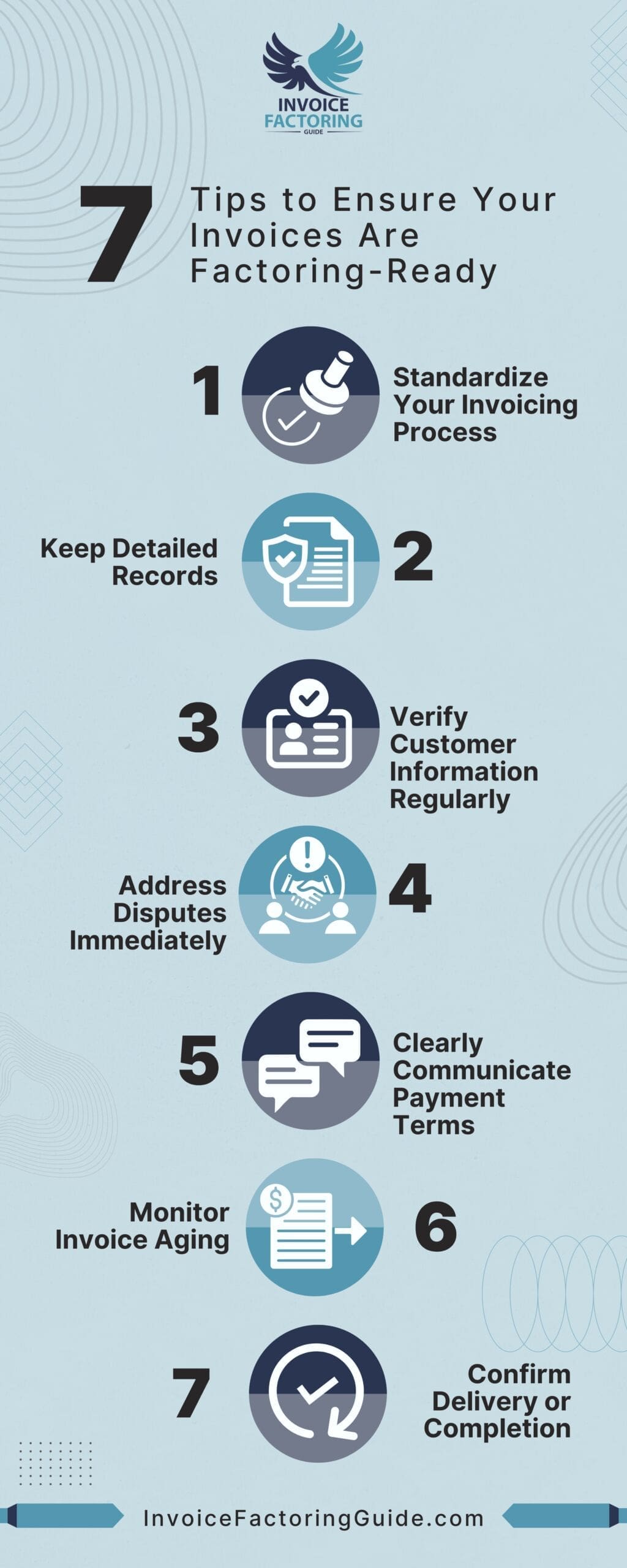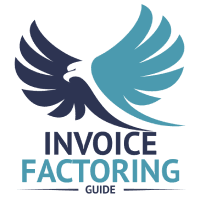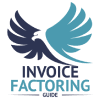
You’ve probably heard that getting started with invoice factoring is complicated and filled with paperwork, detailed requirements, and endless revisions. But here’s the good news: if you’re already invoicing customers for completed work or delivered products, you’re likely closer to factoring-ready than you think. While there are a few key details that factoring companies look for, your current process may be ok as-is or only need minor adjustments. In this guide, we’ll walk you through exactly what factoring companies expect and offer tips for invoice factoring preparation so you can unlock faster cash flow with minimal effort.
The Basics of Invoice Factoring
Invoice factoring is a financial solution that lets you convert unpaid invoices into immediate cash. Instead of waiting for customers to pay you on their own terms, you can sell those invoices to a factoring company for an upfront cash advance.
How Factoring Works
- Work: You complete work or deliver a product.
- Invoice: Issue an invoice to your customer, who usually has 30, 60, or 90 days to pay.
- Get Paid: Sell that invoice to a factoring company, which advances you 60 to 95 percent of the invoice value.
- Receive Balance: When your customer pays, the factoring company sends you the remaining balance, minus a small fee for their service.
Benefits of Invoice Factoring
- Immediate Cash Flow: Factoring gives you fast access to cash without waiting for customers to pay. This means you can cover payroll, buy inventory, or take on new projects without delay. For additional strategies on business cash flow management, explore these cash flow management tips to help you expand.
- No Additional Debt: Unlike loans, factoring isn’t adding debt to your balance sheet. You’re simply getting paid sooner for the work you’ve already done.
- Easier to Qualify: Factoring is based on customer creditworthiness, not the creditworthiness of your business. So even if you have less-than-perfect credit, factoring could still be an option, as long as your clients are reliable payers.
- Flexible Funding: The more you invoice, the more funding you can access. It scales with your business, making it perfect for businesses experiencing growth or seasonal fluctuations.
- Outsourced Collections: Factoring companies often take over the task of collecting payment from your customers. That’s less stress for you and more time to focus on running your business.
Key Requirements for Factoring-Ready Invoices

When you’re factoring your invoices, the details matter. Factoring companies want to see that your invoices are clear, complete, and easy to verify. Here’s what you need to make sure your invoices are up to standard.
The Invoice Must Be for Completed Work or Delivered Products
Factoring companies won’t buy invoices for work that hasn’t been completed or products that haven’t been delivered yet. You need to have already fulfilled your end of the bargain.
Clear and Accurate Invoice Details
Your invoice should leave no room for confusion. The factoring company and your customer both need to know exactly what was provided. This includes:
- Customer’s full details (company name, address, contact info)
- Your business details
- Invoice number (unique to avoid duplicates)
- Description of goods/services
- Payment terms (net 30, net 60, etc.)
- Amount due (broken down if needed)
Verifiable Customer Information
Since the factoring company takes on the risk, they need to ensure your customers are reliable. This means providing clear and accurate customer contact information, especially for whoever handles payments or accounts receivable.
Many factoring companies will run a credit check on your clients before accepting the invoice, so working with creditworthy customers can speed up approval.
Non-Disputed Invoices Only
Factoring companies won’t work with an invoice that’s being disputed by your customer. If there’s an argument over the quality of the work, missing deliverables, or incorrect pricing, resolve it before trying to factor the invoice.
Assignable Invoices
The invoice must be “assignable,” meaning you have the legal right to sell it to the factoring company. Some contracts with your customers might have clauses preventing this, so check your agreements before factoring.
Proof of Invoice Submission
Factoring companies will want to know that the invoice has been sent to your customer and that your customer acknowledges it. Be ready to provide proof that the invoice was submitted and accepted.
Tips for Ensuring Your Invoices are Factoring-Ready

Now that you know the basics of the process and understand the factoring company’s criteria for invoices, let’s go over some tips to help ensure your invoices are in tip-top shape.
Standardize Your Invoicing Process
Consistency is key. Use a standard invoice template that includes all necessary details. This not only speeds up the factoring process but also reduces the likelihood of errors.
Many accounting software options have customizable invoice templates that ensure you include all the right information every time to boost invoice accuracy.
Keep Detailed Records
Maintain thorough records of all transactions, communications, and agreements with your customers. This way, if the factoring company has questions or needs additional verification, you can provide supporting documents quickly.
For example, save email chains, signed delivery receipts, and any written agreements or contracts related to the invoice.
Verify Customer Information Regularly
Customer details can change. People move offices; phone numbers get updated. Regularly verify that you have the correct and current contact information for your customers, especially for their accounts payable department. To help ensure you stay on track, set a reminder every quarter to review and update your customer contact list.
Address Disputes Immediately
If a customer raises an issue with an invoice, resolve it as quickly as possible. Disputed invoices can’t be factored, so it’s in your best interest to handle any problems right away.
For example, if there’s a complaint about a service, address it immediately, correct the issue, and get confirmation that the customer is satisfied before moving forward.
Clearly Communicate Payment Terms
Make sure your payment terms are clear and agreed upon before you deliver goods or services. This minimizes misunderstandings and disputes later on. If your business operates in Florida, collaborating with factoring companies in Florida can help ensure smooth client communication and adherence to regional payment practices, reducing potential delays.
It’s also a good idea to include payment terms on your invoices and in your initial contracts or agreements with clients.
Monitor Invoice Aging
Keep an eye on your accounts receivable aging report. If you notice invoices are consistently overdue, it could be a sign of a problem with a customer or your invoicing process. Note that regularly reviewing your aging report can help you spot trends and take action before issues affect your cash flow.
Confirm Delivery or Completion
Always get confirmation that goods have been delivered or services have been completed to your customer’s satisfaction. This can be in the form of a signed delivery receipt, acceptance email, or other written acknowledgment.
For example, you may want to use delivery tracking and require a signature upon receipt for large shipments.
Walk Through the Process with a Factoring Specialist
A factoring specialist can walk you through the process, answer all your questions, and help you get started. To take the next step, request a complimentary factoring quote.
FAQs on Invoice Factoring Preparation
What details should be included on a factoring-ready invoice?
A factoring-ready invoice needs clear details: the customer's name and contact info, your business info, a unique invoice number, a description of goods or services provided, payment terms, and the amount due. It should be free of any errors or missing details that could cause delays in the factoring process.
Can I factor an invoice for work that isn’t completed yet?
No, factoring companies only accept invoices for work that has been fully completed or goods that have already been delivered. The factoring company needs to know that the customer has no reason to dispute the invoice and that they’re simply waiting for the agreed-upon payment date.
What are the common reasons a factoring company might reject an invoice?
Factoring companies may reject invoices due to disputes between you and your customer, incomplete or inaccurate invoice details, poor customer creditworthiness, or if the invoice is for work not yet completed. They might also decline invoices for customers outside of agreed-upon industries or geographic areas.
How do I resolve disputes with customers to make my invoices factoring-ready?
Address disputes immediately. Communicate with your customer to understand their concerns, whether it’s a quality issue or a pricing disagreement. Resolve the problem, provide any missing deliverables, and ensure both sides are satisfied. Only factor invoices that are undisputed and reflect completed work.
What happens if my customer doesn’t pay after factoring an invoice?
If your customer doesn’t pay, the factoring company may either ask for repayment of the advance or keep any funds owed to you from other factored invoices. Some factoring agreements offer “non-recourse” options where the factoring company assumes the risk, but this often comes with higher fees.
How do I ensure my invoices accurately reflect the services provided for factoring?
Clearly describe the services provided or products delivered on the invoice. Include details like dates of service, quantities, or other specifics that confirm what was completed. This prevents confusion or disputes and gives the factoring company confidence that the invoice is accurate and complete.
How often should I perform audits and updates to keep my invoicing process factoring-ready?
Perform regular audits and updates on your invoicing process, at least quarterly. Ensure that customer information is up-to-date, verify that your invoice templates are compliant, and check for any issues with past factored invoices. Regular reviews help catch errors and ensure smoother factoring transactions.

About Invoice Factoring Guide
Related Insights
Get an instant funding estimate
Results are estimates based on the calculated rate and the total invoice amount provided.
Actual rates may vary.
Request a Factoring Rate Quote
PREFER TO TALK? Call us at 1-844-887-0300










